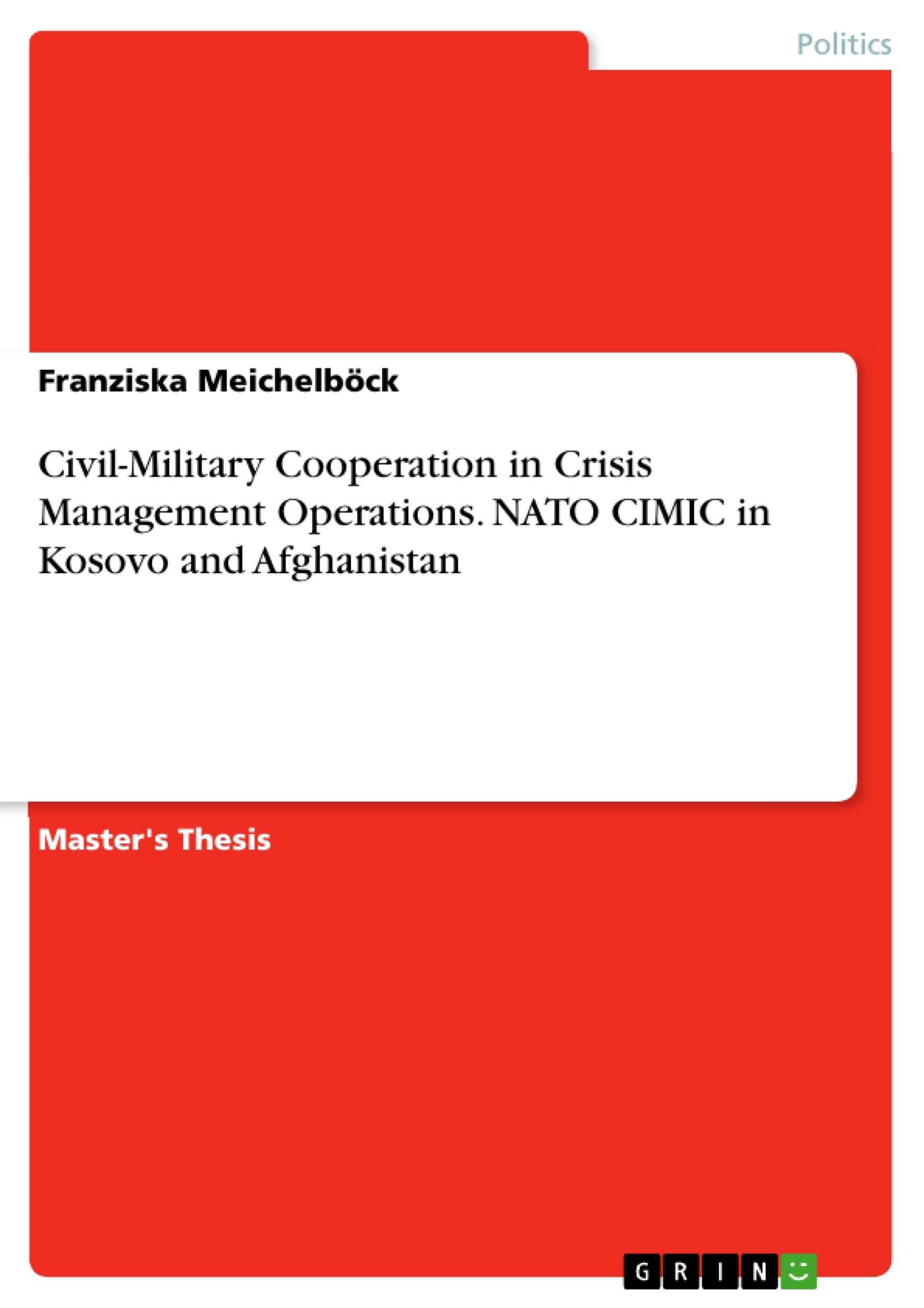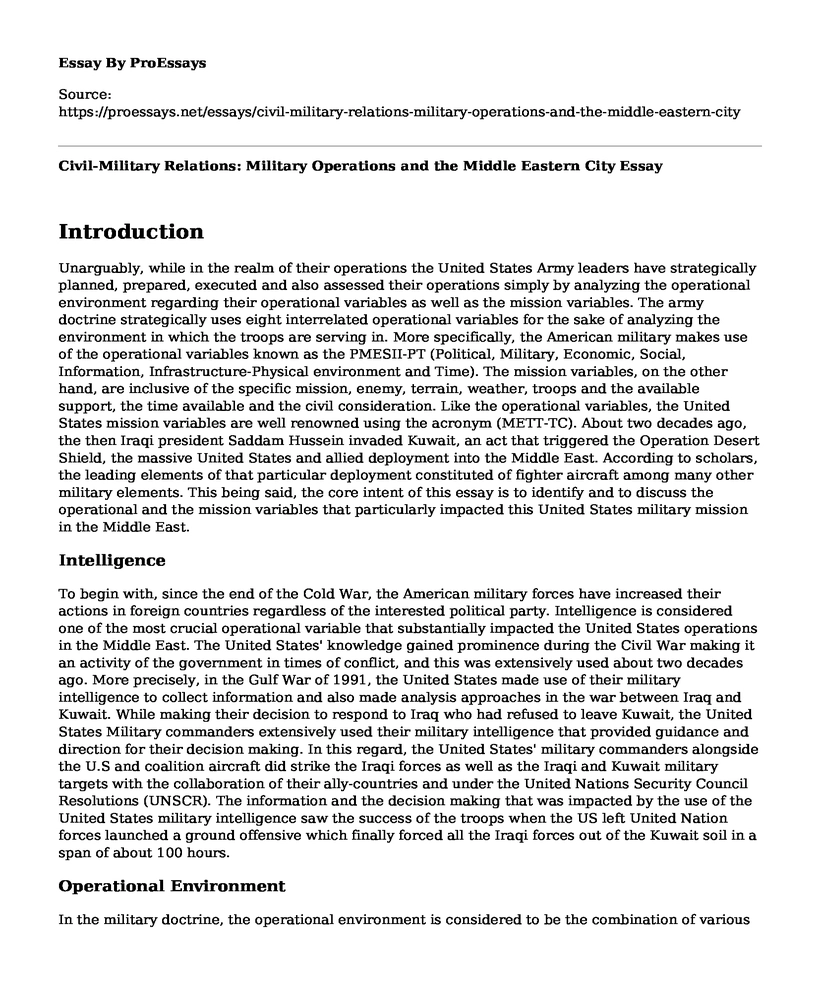Civil Military Operations - Iraqi farmers stand outside a rural school while a US military civil affairs team assesses it for possible renovation (near Baghdad, April 2005).
Civil-military operations, or CMO, is the function of a military force to minimize civilian interference and increase civilian support for military operations. CMO is conducted in conjunction with combat operations during wartime and is an important part of the counterinsurgency military campaign. Some militaries have specialized units dedicated to conducting CMO, such as civil affairs forces, or create special task forces specifically for these purposes, such as the US Army's Civil-Military Operations Task Force. Also, some militaries have staff units dedicated to CMO planning and coordination for their command. CMO is often referred to as Civil-Military Cooperation or CIMIC in NATO operations and Civil-Military Coordination in UN operations.
Civil Military Operations

Military action refers to an action to ensure that military commanders understand, utilize, and mitigate any adverse effects of civilian forces on military operations and programs.[1]
A Gap In Thought And Deed: Civil Military Relations And Civil Military Operations
A commander's function of establishing, maintaining, influencing, or exploiting relations between military forces, governmental and nongovernmental civilian organizations, and officers and civilians in a cold, neutral, or hostile operational area is to facilitate, coordinate, and coordinate military operations. and to achieve US operational objectives. Civil-military operations include the performance by military forces of activities and functions that are the responsibility of local, regional, or national government. These operations may occur before, during, or after other military operations. In the absence of other antagonisms, they can occur if activated. Civil-military operations may be conducted by designated civil affairs, other military forces, or a combination of civil affairs and other forces[2]. References[edit] Importance of Civil-Military Relations in Managing Refugees and Internally Displaced Persons M.A.J. Joyce Craig, US Army
Refugees and internally displaced persons (IDPs) affect all countries in the world. Due to natural disaster, civil strife or war, their situation is usually worse. These vulnerable people will need assistance from the country's government if they are internally displaced, or if they are refugees. When Hurricane Katrina devastated the Gulf Coast, even a first-world country like the United States faced a crisis of internally displaced people. The crisis left thousands of Americans homeless and, in many cases, completely dependent on the government for assistance. This is a problem that affects everyone and requires a civil-military joint effort to determine the best possible solutions to this problem.
A commander entering or being assigned to an area with a significant refugee or forcibly displaced population must understand the importance of not neglecting the population group. Ignored refugee or displaced populations can pose additional security and logistical problems and hinder the mission. If there is not enough supply to interrupt the process, they will leave the camps in search of additional supplies. If the security situation in the camp is not acceptable, they may also leave or join together and form a rebellion, which may cause problems in the future. Commanders need to understand the impact that refugees and internally displaced people can have on their mission.
For commanders assigned to areas with large numbers of refugees or IDPs, it is critical to understand the operational environment and know who is working alongside them in their operational environment. Many non-governmental organizations (NGOs) specialize in refugee and IDP issues and may already be working in their Area of Operation (AO). Commanders must meet with these organizations before taking action. They are experts in their field and understand the situation on the ground and the needs of the affected people. Commanders do not have the authority to work with these outside agencies, but the wealth of knowledge available to these civilian organizations can improve commanders' situational awareness and understanding of how to deal with various issues. NGOs often have cultural knowledge of the area and may have gained the trust of the people in the camps.
The Afp Civil Military Operations Tab Stock Photo
Within their military organization, commanders may have civil affairs staff who specialize in civil-military coordination and can greatly assist in managing IDP and refugee issues. Commanders who have civil affairs personnel in their company have an advantage. A civil affairs officer, G-9 or S-9, may be the focal point for civil-military coordination within an organization. The G-9 and its staff must effectively integrate civil considerations into each COA (METT-TC's ``C'' [Mission, Enemy, Terrain and Weather, Available Troops and Support, Time Available, and Civil Considerations). . The G-9 and its staff consider not only tactical but also logistical issues.
Civil affairs personnel have several primary tasks, but one focuses on managing refugees and displaced persons.1 Civil affairs officers understand the importance of civil-military coordination and have the background and training to conduct key operations with NGOs. "Civilian agency involvement in foreign operations is one of the most important factors in mission success... U.S. civil affairs forces have demonstrated time and time again the importance of military assets, working in coordination with the U.S. State Department and USAID [USAID] in long-term emergency response and recovery efforts."2
Population and resource control is a key civil affairs issue that clarifies how to work with displaced citizens and allows civil affairs staff to understand the complexities of working with this vulnerable population. DC operations include planning and management of DC routes, assembly areas and camps. DC operations also include overseas humanitarian assistance to affected populations. The Military Police Corps is a vital component in the successful planning and execution of DC operations and their involvement in the planning process should be sought early. 3 Figure 4-1, Field Manual (FM) 3-05.40, Civil Affairs Operations, illustrates the basic tasks of civil affairs personnel:

A Civil-Military Operations Center (CMOC) is an important facility that allows military and civilian agencies to meet at a neutral site. The CMOC is a clearing house where civil-military coordination can take place. Civil affairs staff may arrange regular meetings with various NGOs and representatives of the country's military or government agencies operating in the area.
Pdf] Task Force Gator: Best Practices In Civil Military Operations
During these meetings, a broad civil-military system can be activated. CMOCs help improve unity of effort and, more importantly, reduce duplication of effort.
Even if the brigade does not have a civil affairs officer assigned to it, the commander should establish a CMOC and collaborate with the interaction community in the assigned area of the brigade. These meetings allow the commander to understand his operational environment and those working with him. Although there are no organizations exclusively dedicated to refugee operations assigned to this particular area, there may be some NGO organizations that can assist in providing medical aid or other supplies. The CMOC meeting will push out all of this information. Figure 4-3, Joint Publication (JP) 3-57, Civil Affairs Operations, illustrates this relationship.
There can be reluctance and sometimes mistrust in the NGO community when working with the military. CMOC meetings can help alleviate that disbelief. NGOs will better understand the military mission, while the military will see how best to support civilian organizations and their operations. Each team can discuss their skills and goals and begin to build the confidence they need to work together.
NGOs have extensive cultural knowledge of the region and can be very helpful. Their knowledge of the people, language and various tribal groups is good information to help the commander determine the best COA. Additionally, the military has large lift capabilities and can move essential humanitarian supplies. NGOs sometimes do not get that opportunity. They can access vital life but cannot always carry it. These are all questions that can be addressed at meetings of the ICRC.
Civil Military Operations Center
Civil-military coordination is a critical part of mission success during refugee and displacement operations. Civil affairs officers and non-commissioned officers already understand the importance of coordinating and coordinating the efforts of various organizations and can be commanders. However, even if a company does not have a civil affairs officer, there are still tools the commander can use. Establishing a CMOC and providing a neutral space for NGOs and other agencies to meet and coordinate efforts for unity of effort will initiate this dialogue.
2. Kathryn Hicks, Christine E. Warmuth, The Future of America's Civil Affairs Force. 2009 CSIS International Security Program Report. Online at http://csis.org/files/media/csis/pubs/090219_hicks_futurecivilaffairs_web.pdf. Accessed April 21, 2012.
Contents |: Introduction | Chapter 1 | Chapter 2 | Chapter 3 | Chapter 4 | Chapter 5 | Chapter 6 | Chapter 7 | Chapter 8 | Chapter 9 | Chapter 10 | Chapter 11 | Chapter 12 | A Chapter 13A Civil Military Operations Cter, or CMOC, is typically established by a military force in an area of operations to coordinate civil-military operations.

This cter usually serves as a military and meeting place
The Pillars By Cmo School
List of military operations, civil military operations center, military operations room, military operations research, us military special operations, military operations training course, military operations, military information support operations, covert military operations, military information operations, military special operations units, military special operations
0 Comments